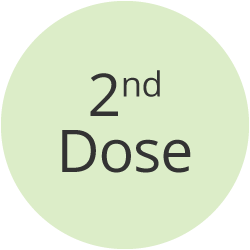

Five doses of a DTaP shot for children and one Tdap shot for preteens are recommended by doctors as the best way to protect against tetanus.
One dose of DTaP at each of the following ages:





One dose of Tdap at the following ages:

There are 2 vaccines that help protect children against tetanus: DTaP and Tdap. Both also protect against diphtheria and whooping cough. These shots do not offer lifetime protection. People need booster shots to keep up protection.
Tetanus shots are safe and effective at preventing tetanus. Vaccines, like any medicine, can have side effects. These are usually mild and go away on their own.
Most children don’t have any side effects from DTaP or Tdap. The side effects that do occur from DTaP are usually mild, and may include:
More serious side effects are very rare but with DTaP can include:
The side effects from Tdap are usually mild, and may include:
Some preteens and teens might faint after getting Tdap or any other shot.
To prevent fainting and injuries related to fainting, people should be seated or lying down during vaccination and remain in that position for 15 minutes after the vaccine is given.
Prepare for your child's vaccine visit and learn about how you can:
 young man holding his cheek in pain." />
young man holding his cheek in pain." />
The first sign is most commonly spasms of the muscles of the jaw, or “lockjaw.”
Tetanus is a serious disease caused by a toxin made by a bacteria called Clostridium tetani. It causes painful muscle stiffness and can be deadly.
When the tetanus bacteria invade the body, they produce a toxin that causes painful muscle contractions. Another name for tetanus is “lockjaw.” It often causes a person’s neck and jaw muscles to lock, making it hard to open the mouth or swallow.
Tetanus is very dangerous. It can cause breathing problems, muscle spasms, and paralysis (unable to move parts of the body). Muscle spasms can be strong enough to break a child’s spine or other bones.
It can take months to recover fully from tetanus. A child might need weeks of hospital care. As many as 1 to 2 out of 10 people who get tetanus dies.

Stepping on nails or other sharp objects is one way people are exposed to the bacteria that cause tetanus. These bacteria are in the environment and get into the body through breaks in the skin.
Tetanus is different from other vaccine-preventable diseases because it does not spread from person to person.
Tetanus bacteria are found in soil, dust, and manure. They get into the body through breaks in the skin, including:
The Centers for Disease Control and Prevention, American Academy of Family Physicians, and American Academy of Pediatrics strongly recommend children receive all vaccines according to the recommended vaccine schedule.